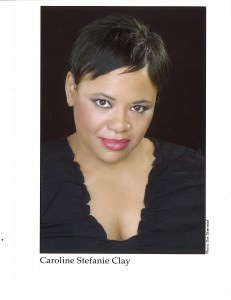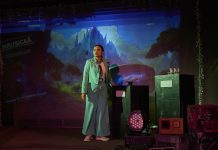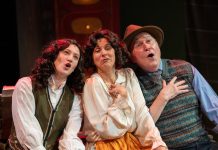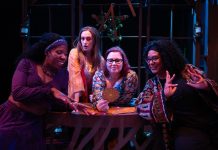Caroline Clay is a phenomenal woman. Her extraordinary acting skills and God’s gift of performance talent are only preceded by her grace, beauty, and kindness Forum Theatre’s Clementine and the Lower 9, one of the most rewarding productions that I have seen all season, closed this weekend where Caroline Clay played the lead and performed a master class in acting.
Today, she is performing in another projected directed by Derek Goldman at Georgetown University, the Theater of the Voiceless: International Symposium and Festival of Documentary Theater. It’s a staged reading of a play called Hate Radio by Milo Rau about the Rwandan radio station RTLM and their role in the genocide that occurred between the Tsutsis and Hutus.
In Part I of our interview, Caroline Clay recently talked with me about acting and Clementine and the Lower 9, her latest play in the DC area since her 2008 Helen Hayes award performance for Best Supporting Actress in a Non-Resident play for Doubt.
In Part Two: We go deeper and get more personal with Caroline Clay, as she discusses the creative process and her Helen Hayes Award win, her greatest joys, career mistakes, and the impact of a life in the theater and the future.
Sydney-Chanele: How would you describe where you are in your life … and your career at this moment?
At this moment my life and career are at a very dynamic place in that I have just completed a very academically vigorous MFA Program at the University of Maryland having received my MFA in Performance with a Specialization in Voice and Dialect. I returned to school as a mid-career professional (Clay giggles) Translation: I’m no young ingénue. My decision to return to school was not an easy one, especially since I have already been a part of the profession and had enjoyed success. Many friends did not understand why I would leave the business to pursue school. Actors are often tethered to New York and LA by fear. They fear that they will be forgotten if they leave, and that their agents might drop them if they fail to make them money. My agent is extraordinary, her attitude was, “Caroline you will graduate – happier with more marketable skills than you imagined. A happy actor is a working actor. Follow your heart. You will always have a home with this agency.” I am still with my agent and after almost 13 years, and we still make a great team.
I now have two full one-woman shows that I have written and are performance ready: Let It Flo! Radicalism’s Rudest Mouth – The Life and Times of Flo Kennedy, and Sepia Sculptress: Edmonia Lewis. I came from a very traditional performance model. (I had an agent. The phone rang, I would audition, I would book a gig, perform, there would be a rehearsal period, performance, and closing. Then it would begin again). At no point did it occur to me that could I have any ownership over my artistic decisions from beginning to end. That I could “be the change I wanted to see” in terms what I performed on stage and the women I portrayed. I am now reinvigorated with options and choices that I had not considered, as I re-enter the job market. I walk with the new empowerment of an artist-scholar with a particular focus on ethno-anthropological resonances present in the untold stories of forgotten women of color, a playwright, a student of voice in training to designate to teach the Linklater Voice technique, and an emerging feminist: complete with all of the implications of how that may make my work and life richer for me and the students that I teach.
How were you introduced to Theatre, and how did the way in which you were raised have an effect on you becoming an actor?
I was introduced to Theatre early. Living in a city like Washington, D.C. affords you so many activities that are Theatre related. I grew up going to the Folger Theatre, The Kennedy Center, going to the Smithsonian, and seeing LaVerne Reed’s musicals at Howard University. Going to Duke Ellington High School for the Performing and Visual Arts in Washington, D.C. introduced me to a world of black dance, theatre and visual arts.
I was raised in Northwest D.C., and I was one of the few blacks in my elementary school. I’ve always been social and had friends, but I know my mother in particular wished I had grown up around more children of color. I think she feared I was in for a huge identity crisis when I went to a larger school with more diversity, and she was right. It wasn’t until middle school that I felt the collision of a painful adolescence, awkwardness, and invisibility all at once. Once I got into Duke Ellington I found my identity as a young person of color, and as someone with something unique to offer.
What motivated you to pursue acting? And, acting as a professional career path?
Duke Ellington was the beginning. I followed a friend to the audition and got in. I was never particularly superlative in middle school and Jr. High School. I was chubby with a big jheri curl, and miserable, because I knew I was bright and meant for great things, but felt trapped. Acting saved my life, the teachers at Ellington: Lynda Gravaat, Fred Lee, Donal Leace, the late Mike Malone, and I say this without reserve, saved my life. They provided me an outlet for my energies, my intellect, my imagination, and my physicality. The power of affirmation cannot be underestimated. These instructors, many of them graduates of Howard University School of Theatre, continued the legacy begun by their mentor, acting teacher, Vera Katz.
Upon graduation, I went straight into another conservatory environment, the University of the Arts in Philadelphia – a wonderful training ground that was regionally, the midpoint. (It was faster than D.C. but not as fast as New York). In the three years at U of A, I played roles from every genre (Yerma, Titania, Hedda Gabler, Getrude, Juliet, and Blanche DuBois) thanks to the insistence of my mentor and godfather, Yale Drama School educated Walter Dallas, lovingly known as “Dr.D” who’s own mentors included Lloyd Richards and August Wilson. I became a company member at the classical Philadelphia Area Repertory Theatre Company, got my Equity card right out of undergrad, and through Freedom Theatre, one of the premiere Black Theatres in the U.S., met my late mentor, Artistic Director John E. Allen Jr., and learned of playwrights Bill Gunn, Leslie Lee, Cheryl L. West, and of course, August Wilson. It was through doing Joe Turner’s Come and Gone at the Annenberg Center that I met the New York actors that would convince me to move and transition to my next chapter that would then become my home base for the next 17 years.
In your acting career, what mistakes have you made that you recognize now as great learning lessons?
I am way too sensitive. I can act ferocious but I tend to live in a state of terror. I have actor friends who treat auditions like running simple errands. How I admire them! If they get it fine, if not, that is the extent of their investment. They audition and no matter how it goes, when it’s done. It’s done. They have left nothing of themselves in the room, none of their self-worth, so that later it might provide ammunition for self-doubt. I had an audition recently where the folk behind the table were colder than two popsicles in January – just unfriendly. I find that casting folk in D.C. tend to be a bit hardcore, as if there is something to prove – perhaps a need to dismantle the actor ego a bit- who knows?
Mistakes? I make them every day. I don’t look heavenward and say “thank you” enough. (Not in a religious sense either, because I am not. I am spiritual.) The women in my family run with wolves and howl at the moon (Caroline laughs): wild women, educated women, women of breeding, resources and exposure who claim the spaces we occupy and have a very primal sense of justice, love, wrong, right, sensuality, and integrity. In many ways the women in my family, my mother, my aunts, cousins, and extended women friends overwhelm me with their ferocity. That’s why I am so drawn to people like Florynce Kennedy and Gloria Steinem as friends and subject matter for my plays.
I am leading a double life right now. People ask me how I am and I say “fine”, but no one has any idea what is going on to keep these balls in the air. Here’s an overview of this past week in my life: teaching my summer acting class at University of Maryland every day, rehearsal with director Derek Goldman on the play called Hate Radio about atrocities during the Rwandan genocide at Georgetown University. Traveling by train up to New York twice for a table read with Sarah Jessica Parker and Blythe Danner for an upcoming play in Manhattan Theatre Clubs’ new fall 2013 season, then back in the evening for an 8pm curtain of Clementine. I am filled with gratitude for my life.
Wow. You are juggling a lot – but that’s what we want with an artistic life. You mentioned Florynce Kennedy, and I know you recently created a one-woman show on her.
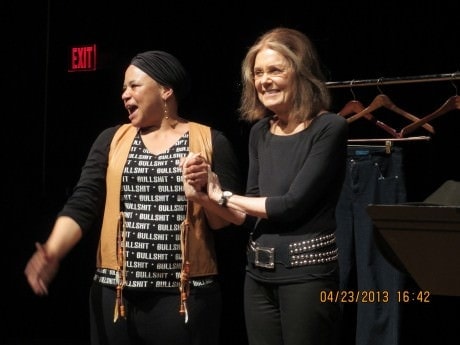
Tell me about Let It Flo! What are your hopes for the show’s future?
I continue to refine, edit and work with my dramaturg and directors of Let It Flo! Gloria Steinem is so generous with her resources regarding the development of this piece, its now about merging it with the right theatre to showcase it. Theatres in this area are not showing the interest I had hoped. So, onto the Public Theatre in New York, and other workshop venues where it will be nurtured and appreciated. The subject matter and language is strong, but I come from a legacy of the unafraid! Ultimately what I have to say might have to be produced in an independent venue. In the meantime, I’ve got to Let It Flo!
What is it like when you enter into the state of creativity? Do you have a process?
Creativity doesn’t happen for me. It must be doggedly chased and pursued. All you can do is set yourself up for success by being as prepared as possible and you still run the risk it won’t work. I try to arrive with my head right and in the zone to work as much as I can by being warmed up and available to those around me particularly with solo work. Because I set the tone, everyone is looking to me to see how to feel about the project – their excitement and enthusiasm only runs as deep as mine does.
Yes, I have a process and that is entered primarily through warm up. I do a 45 minute warm-up of the classical Linklater Progression graciously put together by my voice mentor Leigh Wilson Smiley which is a series of exercises that integrate the awareness of the body breath/ breath impulse, connections which wake up the diaphragmatic muscles, the spine, and channel, the resonators, and the articulations. I then take myself through a vigorous Sun Salutation I & II and hip openers where lots of tension and rage are stored. By that time I’m in a sweat and famished. I can’t eat before a show but I sip water, steam, drink a sweet tea, and yes, I’m guilty, I do have a pre-show coffee ritual which makes me happy which while I know is drying (the caffeine) is my one pleasure. After the show, I hum down to warm down my vocal chords. As the daughter of a Kentuckian, when I get home, I will have a scotch toddy – usually a warm Makers Mark. My throat is happy and I am thrilled.
You are the winner of the 2008 Helen Hayes Best Supporting Actress in a Non-Resident Production for Doubt. You were also the understudy in the original Broadway Production. You had been with that character a long time. Please tell me about your Broadway history with that production.
I was up for the role and did not book it but was offered the understudy. My wounded pride balked until I realized this was an amazing play, I was unemployed, and I needed to look at the big picture. We were off-Broadway, and that was fun in that was clear very early on after the reviews came out that a transfer to Broadway was imminent. My greatest joy was booking Doubt on Broadway was an understudy. Once we got into the Walter Kerr Theatre, I had my own dressing room, my own costume, everything I might need to go on at a moment’s notice. I learned patience on so many levels. The bible says, “Learn to labor and to wait.” I did and it paid off. I had the opportunity to watch people at the top of their game as I perfected my own. Watching Tony winners’ Cherry Jones and Brian F. O’Byrne every night was like watching a combustible fire on stage. Adriane Lenox, who I understudied and who would go on the win the Tony Award for the role, was incredibly generous with telling me when she would be out so that I could get my press folk, representation, and agents in there to see me. I would go on to do the National Tour and win the Helen Hayes Award in my hometown. That meant everything to me. I was so proud because I had understudied three times back to back, Alfre Woodard in an adaptation of The Seagull, S. Epatha Merkeson in Come Back Little Sheba, and Adriane Lenox in Doubt. The challenge was to keep busy and not languish, always stay sharp, ready, and grateful.
What do you remember most about that experience, and what did the Helen Hayes award win do for you?
It was a blur. I was the only one from our cast who could attend: Cherry Jones and I won. When they called my name everything went in slow-motion. I was so shocked and yet not at all. My mother looked at me and said, “You won!” I got on stage, hugged Derek Jacobi way to tight and said something off-color about my girdle being too tight! I was in rare form. I had a blast. It was so amazing. To be able to have it on my resume continues to be a source of pride. I took pictures with Derek, and that was amazing I, Claudius is hands down my favorite BBC television series of all time.
How have you changed as a performer in the last 10 years?
I used to be the busiest actor on stage that I knew. “Busy”: meaning my choices weren’t clear, my thinking was muddy, and consequently, I was constantly moving, generating a lot of motion but little meaning. I did not trust nuance and subtly, nor my ability to hold an audience’s attention with the power of my intention and desire to communicate. I now do less. By less I mean I trust that I can think a thought, breath in an impulse and let the release of the jaw, the forehead, the buttocks, the arches, the eyebrow, the third eye, and the spine growing longer: all work in concert with one another. I can literally generate warmth from the inside out through visualization, breath, imagery, and impulse. Not to sound to New Age-y because this is very real for me – but when I’m on stage you are watching a process of unlearning, stripping away, and of getting out of the way of whatever has built up during the day that might act as an obstacle to free breath from the belly that isn’t useful. When I am truly alive on stage, you can see my chakras at work. I blaze. People tell me I literally shine. It’s not about upstaging anyone or stepping out of the storytelling to draw the focus. Rather, it’s about deepening that immersion. It’s an embrace of what dancer Martha Graham called, “anything that quickens you to the instant.”
When you are working on a role – when do you know it has become the character that you envisioned. How and when do you know it clicks?
When I “click” on stage in a moment, with a person, or an emotion catches me by surprise and something on stage resonates with me – I am very reluctant to name it. Call me superstitious. Directors must name those things so in the rehearsals, so that they can be identified, repeated, refined, and hopefully turned into moments for the purpose of performance making. That is not my interest. As an actor, I make very definite choices about my characters as I go along: who I am in relationship to everyone on stage, what am I willing to die for, what am I willing to live for? What brings me joy? What are the given circumstances? How high are the stakes every time I speak and how deep is my desire to shift myself, or others? Once I’ve done all of that work, I throw all of it out – not literally, but intellectually. It’s not active, it’s background to help define what makes me tick.
In the end, however, I am the one who acts or is acted upon. Sometimes it is not until a show closes and in retrospect I know that I hit something special. There are those nights (those rehearsals, those fleeting moments where the lights, the music, the text, and the listening skills between the ensemble, you, and your acting partner) that is so acute that it is undeniable. Time stops and you’re a part of something bigger than your self. I’ve never felt that in the medium of film or television – it’s too technical to measure – and so much of your performance is constructed in post-production in editing rooms. Yet the immediacy of live theatre experience is so tangible. The trap is to try to re-create the “magic” you shared with an actor (s) the night before. You must always start from the beginning, with the breath, from a place of innocence and a willingness to be available to the material hitting you like it’s the very first time even if you’ve been doing a seven-month tour. You must begin where you are – in life and on stage.
Is there a performance career path that you most respect or admire? (One who has been an inspiration in the world of theatre and acting.)
There is no one favorite, but I will name someone that nobody ever expects because I think she deserves credit – Ginger Rogers. Yes, Ginger Rogers. (She smiles). Prior to being swept across the dance floors of America by Fred Astaire, she was an amazing actress. There are two movies that I tell every actress to watch because they are both lessons in subtly, listening, and the beauty of knowing exactly who you are and what you project onscreen.
The first is her work in the ensemble piece, Stage Door with Katherine Hepburn where she almost walks way with the film. And the second, is my favorite, Kitty Foyle, where she plays a young woman who follows the love of her life only to be met with the realities of class differences, career disappointments and the death of a child. There is a scene in particular where she has delivered but her baby did not survive. No words are exchanged between her and her friend Delphine in the hospital occur, only eye contact. As she comes out from under the ether and realizes the implications of what has happened, the expression that washes over her face, in her eyes, and the determination to name him anyway so his life would not have been in vain is one of the most moving moments in film. Ginger Rogers was pure steel, yet she was sexy and knew when and how to let a man lead (at least on the dance floor), something I’m trying to learn.
If you could add one skill or improvement to your performance repertoire what would it be?
Singing. I am still so shy when it comes to my voice. There is this little girl inside me who doesn’t believe that she can sing. I can carry a tune, and act the hell out of a ballad, but am I a true vocalist? No. I admire singers so much – it seems to me to be such a God-given talent. You can strengthen a voice but the core of a singer, that ear for melody and musicality is something one is born with I think.
What untapped skill do you possess that the world has yet to fully appreciate from you?
Comedy. I’m working on a stand-up act believe it or not. I play so many serious characters people don’t know that I can be funny. I want to do it because it terrifies me and I think scary things are good for the soul. Working on my one-woman shows are an entry point to my stand -up in a way, particularly Flo, in that so many of her anecdotes are comic. It is such a high with comedy. Either the audience laughs or they don’t. And when they don’t – whew – the silence is deafening. I’m a sucker for that laugh. I love to make people laugh; there is nothing like it. I can’t believe I’ve admitted that I am working on an act, I’ve been afraid to admit it because it scares me so, but its out there now- so ain’t nothing to it but to do it!
What are your dreams?
My dream is to become a parent while I still can. Children are expensive and require a normalcy and routine that I don’t know that I can provide. Yet I have so much love to give and what a life I can show them, I am determined to make a home for a child whether I have one biologically or not – I have mothered my friends, my students, everyone: its time that those instincts are put to true use. I would love to do more television and film and learn to write screenplays. I have film treatments swimming in my head: stories of black Superheroes – everyday people who morph into metaphor and champion while pulling heavily from the Yoruban Orisha gods and goddess motifs. I’d love to see a transfer of the science fiction books of Octavia Butler to screen. I believe Queen Latifah and Jada Pinkett Smith own the rights… the time has come.
What makes acting ALIVE for you?
Everything. The lights, the text, the costumes, the score, my fellow actors, the set, the choices that I make at the beginning that I know will and must change as I learn more about my character. Acting is a craft everyone cannot do it. Instincts and impulses exist in all of us but it is the actor who can identify them, bathe them in breath and imagery and turn them into choices that he can reflect back to us as recognizable behavior that we identify with as our own.
My mentor, the late John E. Allen said acting was the only profession where you can hop out of a taxi in the middle of 42nd Street in New York City and announce, “Hello, I’m an actor.” And at least two people will believe you because it’s not like you need proof, you don’t need documentation, and it doesn’t require credentials. That always made him crazy. An actor should take his training as seriously as a heart surgeon, after all, as an audience member, I hand you my heart and soul at the door, you damn well better know what to do with it!”
LINKS
An Interview with Caroline Clay of ‘Clementine and the Lower 9′ at Forum Theatre Pt. 1 by Sydney-Chanele Dawkins.
Clementine in the Lower 9 review on DCMTA.
Theater of the Voiceless: International Symposium and Festival of Documentary Theater
Caroline Clay’s website.


